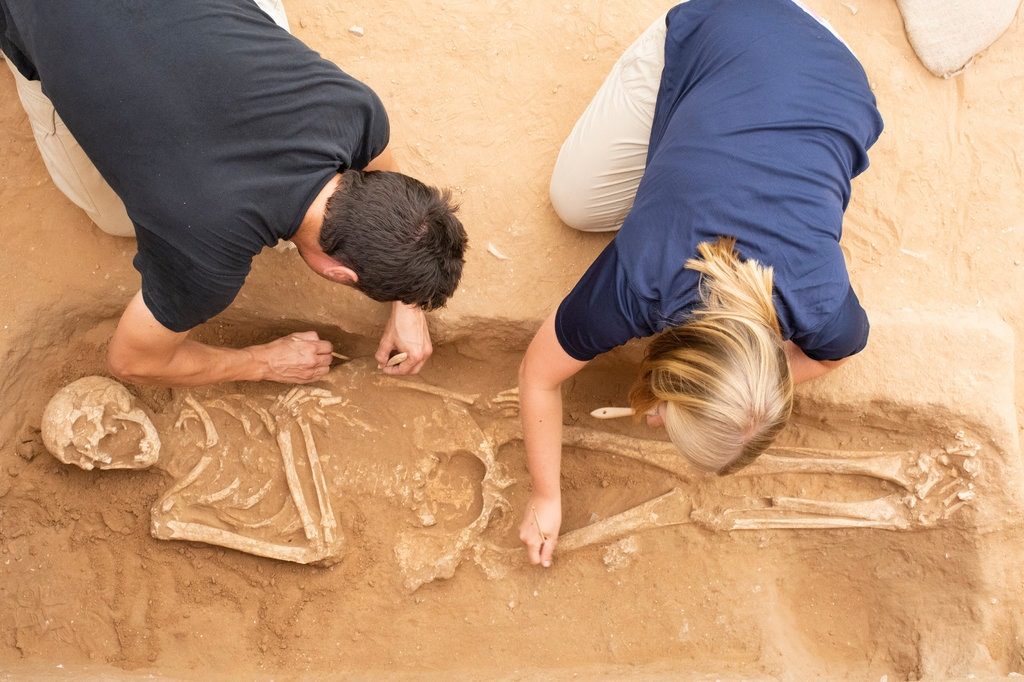They are a very prominent enemy in the Jewish bible. As a youth, King David defeated one of their mightiest of warriors – Goliath. Samson killed a thousand of their warriors with the jawbone of a donkey.
Verses in the bible tell us that they were from Caftor. They appear in the ancient writings of Egypt, Babylonia, and Assyria. Jewish Midrashim point to Orpah the Moabite as a progenitor of Goliath – but that does not necessarily reflect the origin of the Philistines themselves. Goliath could have merely had a Moabite grandmother.
But, surprisingly, little is known about the origin of the Plishtim or Philistines.
That is, until now.
Now, for the first time, DNA evidence has been gathered and analyzed from ten skeletons in the sea port city of Ashkelon. The skeletons date from the Bronze and Iron Age.
The study was published in a journal called “Science Advance.” The ancient Mediterranean port city of Ashkelon was identified as “Philistine” during the Iron Age. However, historians noted that Ashkelon underwent some very serious cultural changes between the Late Bronze and the early Iron Age.
Why did this change occur? Was it because new people moved in? Was it the “sea People” mentioned in Egyptian sources?
The study, headed by Daniel Master, was initiated by the Leon Levy Expedition to Ashkelon. It showed that although there definitively was an infusion of genetic material from people who originally came from southern Europe – the majority of the Philistines were indigenous to the area. Eventually, the genetic infusion was no longer detectable by the Iron Age.
The Philistines figured prominently in the area around the 12th century B.C.E. They lasted there until their destruction by the Babylonians in 604 B.C.E.
“Now we finally have direct evidence for this key idea: Where did the Philistines come from?” said Daniel Master, director of the Leon Levy Expedition to Ashkelon. “They came from outside this region, they came from the West, they came from across the Mediterranean.”
Master’s co-researchers said they could not yet pinpoint specifically whether these people came from Greece, Sardinia, Crete or elsewhere.
Michal Feldman is a graduate student at the Max Planck Institute for the Science of Human History in Germany, and was the lead author on the study. “We kind of managed to narrow it down to Southern Europe, but we are very limited at this point by the amount of reference populations that we have because there are a lot of gaps in geography and time,” she said.
But how did they know that they were not foreigners or strangers? The burial conditions made it clear that both the early Iron Age infants and the later Iron Age adults were culturally Philistines, according to the team.
It is thought by the researchers that although the southern European genetic origin disappeared – the cultural effects did not.
(AP / YWN World Headquarters – NYC)












3 Responses
This is news? For some time it has been determined that the Philistines were connected to Greek area. Why is this important. Secular Jews jump at anything that seems Greek in Tanach as “proof” that it was written in the period of 2nd Bayis when Jews were in regular contact with the Greeks, but if the Philistines were Greeks, it meant we had been in contact with the Greeks for a thousand years earlier, not just during Greece’s classical period, but in their earlier darker period (e.g. the time of Trojan Wars).
Akuperma, the Agaean origin of the Phillistines ( Sea Peoples) had been theorized for many years. This was the first potential proof of that theory.
Why the need to put an anti-religious spin on it?
Hilonim have argued that any evidence of contact between Jews and Greeks is “proof” that the Taanach is a forgery, i.e. written in the period of Bayis Sheini, on the theory that Jews had no contact with the Greeks prior to that time (perhaps while Persia was trying to conquer Greece, and perhaps not until the time Alexander conquered Eretz Yisrael). That the Philistines are related to what later become Hellenic culture, and whom Humash says were in contact with Avraham Aveinu, refutes those hilonim (not that the hilonim will ever admit they made a mistake).